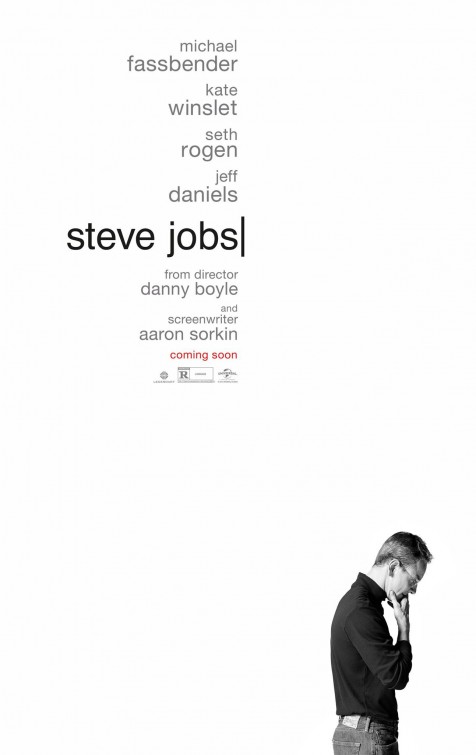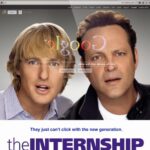Can A Great Man Be A Good Man?
Director
Danny Boyle
Starring
Michael Fassbender
Kate Winslet
The story is divided into three acts, each set minutes before the launch of key products produced by Steve Jobs: Apple Macintosh (1984), NeXT (1988) and iMac (1998). Each time hop is prefaced with a little montage detailing how the computing world has moved on and how the titular character is viewed by the press and public. Each launch is fraught with chaos and hurried interactions before going on stage – the actual presentations themselves are almost irrelevant; it’s the life behind closed doors that we are treated to (specifically underappreciated colleagues, a neglected daughter and the concept of legacy). Jobs [Fassbender] seems solely concerned with the product and getting his message out there as healthily and successfully as possible. It’s evident from his manner, impatience and demands that he expects miracles from his staff and genuinely believes in his own egotistical mission statement. Trying to co-ordinate and filter everyone is Jobs’ right hand, Joanna Hoffman [Winslet], a genuinely pleasant patient woman who believes in her employer and acts as personal assistant, friend and consigliere.
Watching this film, the first comparison that leaps to mind is Citizen Kane. Now, that probably means different things to different people. Many regard Kane to be the greatest film ever made and obviously I’m not drawing that particular conclusion with this release. What people may not be aware of is that Citizen Kane is effectively a loose biopic inspired by the image of newspaper magnate William Randolph Hearst. The names were changed and plenty of liberties were taken but in essence it was Hearst’s life as Orson Welles perceived it. Steve Jobs is the same; simultaneously a biopic and an entirely fictional work as perceived by Aaron Sorkin, only the names have remained the same. Much like The Social Network wasn’t really about Facebook (more the combination of monumental success at an early age and a crippling social disconnection) Steve Jobs isn’t really about its namesake or his products. The technical jargon and the real-life inspiration serve only as a platform for an entertaining work of speculative fiction.
Subsequently this makes Steve Jobs tricky for some to review. Personally, I don’t like reviewing documentaries as separating the quality of the presentation of the subject matter from the subject matter itself is an unnecessarily demanding chore. With 2013’s Jobs, reviews were easy and largely damning. The content was simplistic and sappy, the performances were acceptable but none of the tone seemed accurate. Boyle’s Steve Jobs, on the other hand, uses the source material as an excuse for flamboyant witty wordplay. Case in point, end to end service is still stupid but the film doesn’t really stand on the argument of whether Jobs was right or wrong with hindsight but his ability to manipulate the situation to what he needed, thereby giving a more powerful impression of the kind of man Jobs was, rather than some list of achievements.
Boyle has a very diverse style; you’ll rarely see him do the same type of project twice. In truth this often means his films are without ego and presented to the fullest of their potential. The cinematography, direction and editing ensure that the pace is maintained brilliantly throughout and perform decently from start to finish, while Daniel Pemberton’s score is very serviceable; a nice underplayed mix of Reznor and Zimmer. Having said that, there are a lot of very on-the-nose visual references but that could entirely be because the script refuses to yield to anything but the dialogue. I certainly wouldn’t say this film is a character assassination but a very honest look at life off-stage, out of the public eye, inspecting the man under a very narrow microscope, giving an impression of a flawed individual. This unfortunately makes for a very blunt diagnosis; a lot of the mystery, supposition and ambiguity are robbed from both the narrative and the performances because of Sorkin’s style. His style being Sorkin has something to say and everything else is disposable. But it’s hard to slam Sorkin for too long, the dialogue, while completely spurious, is very engaging and entertaining, delivered with excellence by all involved. They may not be the words that were uttered but they certainly seem to represent the internal workings; like Hughes or Whedon’s razor sharp wit feeling so intrinsically pinpoint to how teenagers wish they could express themselves, while simultaneously being completely fantastical and removed from how they actually engage with one another.
Several supporting cast members, such as Seth Rogen, Jeff Bridges, Michael Stuhlbarg and Katherine Waterston are wheeled out periodically to prompt Jobs into a frothing pool of intensity but don’t seem to add much. This is mostly due to the fact that they all seem to have the same drive and objectives, displaying Jobs fatigue and confronting him about his manner. This leaves the bulk of the work to fall on the two leads. The chemistry between Fassbender and Winslet is wonderful, full of power and energy and tension. These two individuals clearly rely upon each other whilst supporting each other completely. It’s an interesting portrayal of an interesting dynamic and one that thankfully sidesteps (almost completely) any form of sexual drive or involvement – as lesser scripts would have immediately leapt to.
The film falters only when audience opinion is concerned. There are going to be those who see this as an enthralling, gripping representation and others who see it as little more than a fanciful unpleasant diatribe. As with its central focus, this film brings with it all the foibles, ego and traits of its creators many audience members will either love it or hate it accordingly. From a technical standpoint it is a very well accomplished film that happily runs parallel to the truth openly stating, “I don’t care what may or may not have happened, this is the better story” and cinematically speaking, the film benefits.
Release Date:
13th November 2015
The Scene To Look Out For:
Interestingly, this film ends better than The Social Network. Admittedly, The Social Network is a vastly superior film executed magnificently but it ends a little lacklustre, owing to the source material. This is not the case here. Steve Jobs concludes at the dawn of where the general public jumped on. The rock star launches, the technological leaps, the cult of Apple, Jobs’ philanthropy, for lack of better phrasing, we know how the story ends and that allows audiences to piece together their own perspective conclusions naturally.
Notable Characters:
Personally, I’ll watch literally anything with Fassbender in, I find the man captivating. But at no point did I think Michael Fassbender looked anything like Steve Jobs. Not even in the slightest. I don’t think he particularly sounded like Steve Jobs either. But from what I understand, he acted like Steve Jobs and that, from a filmic point of view, is much more important.
Highlighted Quote:
“God sent his only son on a suicide mission but we love him anyway because he made trees”
In A Few Words:
“Depending on personal preference, this will be a divisive release but to my mind it is a well-crafted release that neither besmirches nor elevates the man it’s analysing”
Total Score: 4/5
![The Red Right Hand Movie Reviews [Matthew Stogdon]](https://reviews.theredrighthand.co.uk/wp-content/uploads/2021/12/cropped-header1.png)




